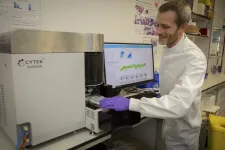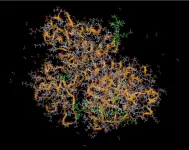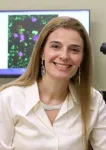(Press-News.org) Only a third of outpatient community mental health treatment facilities in 20 states with the highest opioid related overdose deaths report offering medication treatment for opioid use disorders, suggesting efforts may be needed to strengthen such services, according to a new RAND study.
Among the 450 clinics surveyed, factors that increased the likelihood that clinics would provide medication for opioid use disorders included being a certified behavioral health clinic and providing integrated mental and substance use disorder treatment.
Researchers found that most clinics that did not offer medication treatment said they referred patients to other clinics for such care, with many sending patients to sites that are within the same treatment system. The findings are published by the journal JAMA Network Open.
“Outpatient community mental health treatment facilities can be an important part of the treatment ecosystem for individuals with opioid use disorders,” said Jonathan Cantor, lead author of the study and a policy researcher at RAND. “Further attention is needed to address challenges to offering medication treatment, and to assess whether referral models cited by many of the clinics are effective at meeting patients’ needs.”
States included in the study all have experience high drug overdose rates. They are Arizona, California, Connecticut, Delaware, Florida, Indiana, Kentucky, Maine, Maryland, New Mexico, New York, Ohio, Pennsylvania, Rhode Island, South Carolina, Tennessee, Texas, Vermont, West Virginia and Wyoming.
More than 80,000 Americans died from opioid overdoses in 2021. The standard of care for treating people with opioid use disorder includes the use of medications such as buprenorphine, methadone and naltrexone to aid recovery, an approach associated with reductions in health care use as well as decreased overdose mortality.
Despite its effectiveness, medication treatment remains underused with a recent study finding that nearly 90% of those with opioid use disorder did not receive such care.
Because an estimated 25% of adults with opioid use disorder have a co-occurring mental illness, outpatient community mental health treatment facilities are a potentially important access point for those who can benefit from medication treatment.
To provide an accurate, representative picture of the availability of medication treatment for opioid use disorder in community outpatient mental health treatment facilities, RAND researchers surveyed 450 clinics from April to July 2023 to ask whether they provided such services. The sample included both private and public facilities that accepted public funds as payment for treatment.
The study found that clinics that offered integrated treatment services for people with substance use disorders were more than five times as likely to offer medication treatment as facilities without integrated services. Facilities that reported having a specialized treatment program for treating people with co-occurring mental health and substance use disorders were more than twice as likely to provide medication management.
“Our findings suggest that offering integrated substance use disorder services for people with co-occurring mental illnesses is a potential avenue toward improving uptake of medication-assisted treatment among those with opioid use disorder,” Cantor said.
Other characteristics that were associated with an increased likelihood of offering medication treatment for opioid use disorder include facilities offering housing services and having on-site laboratory services.
Support for the study was provided by the Foundation for Opioid Response Efforts, which had no role in the design and conduct of the study.
Other authors of the study are Beth Ann Griffin, Barbara Levitan, Sapna J. Mendon-Plasek, Bradley D. Stein, Sarah B. Hunter and Allison J. Ober.
RAND Health Care promotes healthier societies by improving health care systems in the United States and other countries.
END
Medication treatment for opioid use disorder offered at only a third of outpatient mental health facilities
Findings suggest efforts needed to expand such services
2024-06-18
ELSE PRESS RELEASES FROM THIS DATE:
Salk scientist Jesse Dixon named 2024 Pew Biomedical Scholar
2024-06-18
LA JOLLA (June 18, 2024)—Salk Institute Assistant Professor Jesse Dixon has been named a 2024 Pew Biomedical Scholar by The Pew Charitable Trusts. This honor provides funding to early-career investigators who demonstrate outstanding promise in science toward advancing human health. Dixon and the other 21 awardees will each receive $300,000 over four years to support their research.
“Through his development and use of leading-edge genetic tools, Jesse has already made a major impact on how we study diseases such ...
Pew supports 22 researchers leading scientific innovation
2024-06-18
PHILADELPHIA—The Pew Charitable Trusts today announced the 22 researchers who have been selected to join the Pew Scholars Program in the Biomedical Sciences. These early-career scientists will receive four years of funding to explore some of the most pressing questions in human health and medicine.
“Pew believes that supporting promising early-career researchers is key to scientific innovation, and for nearly 40 years our scholars have helped change the world—creating lifesaving therapies and responding to emerging health crises around the globe,” ...
Discovery of ‘new rules of the immune system’ could improve treatment of inflammatory diseases, say scientists.
2024-06-18
Scientists at the University of Cambridge have discovered that a type of white blood cell - called a regulatory T cell - exists as a single large population of cells that constantly move throughout the body looking for, and repairing, damaged tissue.
This overturns the traditional thinking that regulatory T cells exist as multiple specialist populations that are restricted to specific parts of the body. The finding has implications for the treatment of many different diseases – because almost all diseases and injuries trigger the body’s immune system.
Current anti-inflammatory drugs treat the whole ...
5 Pew-Stewart Scholars chosen to advance innovative cancer research
2024-06-18
PHILADEPHIA—The Pew Charitable Trusts and the Alexander and Margaret Stewart Trust announced today the 2024 class of the Pew-Stewart Scholars for Cancer Research, five early-career scientists who will each receive four-year grants to explore new avenues in cancer development, diagnosis, and treatment. This is the 11th year the Alexander and Margaret Stewart Trust has partnered with Pew to cultivate a legacy of cutting-edge cancer research.
“Despite decades of groundbreaking research and innovative breakthroughs, millions of Americans are still all too familiar with the devastation and uncertainty of a cancer diagnosis,” ...
Pew funds 10 Latin American scientists conducting biomedical research
2024-06-18
PHILADELPHIA—The Pew Charitable Trusts today announced the 2024 class of the Pew Latin American Fellows Program in the Biomedical Sciences.
The 10 postdoctoral fellows from six Latin American countries—Argentina, Brazil, Chile, Cuba, Mexico, and Peru—will receive two years of funding to conduct research in laboratories across the United States. They will work under the mentorship of prominent biomedical scientists, including alumni from the Latin American fellows program and the Pew Scholars Program in the Biomedical Sciences.
“The grave threats to human health over the past few years—from COVID-19 to growing rates of cancer in younger adults—underscore ...
Accelerating drug discovery with the CCDC, AWS, and Intel
2024-06-18
Thanks to the combined computing power of Amazon Web Services (AWS) and Intel, the CCDC announces that a potentially significant advancement in drug discovery has been achieved. A curated data set of protein structures from the Protein Data Bank (PDB) with predicted hydrogen positions is now available for download. This project was supported by an Intel RISE Technology Initiative contribution.
Historically, collaborations with the pharmaceutical industry have enabled the development of reliable methods for interpreting interactions within protein binding sites using proprietary information not publicly available. Repeating these studies ...
Updates from the 2022 WHO classification of kidney epithelial tumors
2024-06-18
Renal tumor pathology has evolved considerably, expanding from two main types of renal malignant tumors to over 20 distinct types. Diagnostic criteria have advanced from purely morphological features to include histochemistry, immunohistochemistry (IHC), and molecular genetics. The World Health Organization (WHO) and the International Society of Urologic Pathology (ISUP) have been instrumental in updating these criteria, resulting in a comprehensive framework essential for accurate diagnosis, effective treatment, and improved patient outcomes.
The field of renal tumor pathology has undergone ...
Interdisciplinary team at MUSC Hollings Cancer Center maps role of P. gingivalis in drug resistance
2024-06-18
A new paper from an interdisciplinary team at MUSC Hollings Cancer Center describes how the bacteria Porphyromonas gingivalis interferes with chemotherapy-induced mitophagy, allowing oral cancer tumors to become resistant to the drug’s effects.
Besim Ogretmen, Ph.D., SmartState Endowed Chair in Lipidomics and Drug Discovery in the College of Medicine, and Ӧzlem Yilmaz, D.D.S., Ph.D., a professor, clinician-scientist and microbiologist in the College of Dental Medicine, worked with graduate ...
Astronomers see a massive black hole awaken in real time
2024-06-18
In late 2019 the previously unremarkable galaxy SDSS1335+0728 suddenly started shining brighter than ever before. To understand why, astronomers have used data from several space and ground-based observatories, including the European Southern Observatory’s Very Large Telescope (ESO’s VLT), to track how the galaxy’s brightness has varied. In a study out today, they conclude that they are witnessing changes never seen before in a galaxy — likely the result of the sudden awakening of the massive black hole at its core.
“Imagine you’ve been observing a distant galaxy for years, and it always seemed calm and inactive,” ...
A review and update on therapy of gastrointestinal tract tumors: from the bench to clinical practice
2024-06-18
Gastrointestinal (GI) cancers, encompassing esophageal, gastric, small bowel, and colorectal carcinomas, represent a significant global health burden due to their high incidence and mortality rates. This review by M. Jesús Fernández-Aceñero et al. provides an in-depth analysis of the molecular characteristics, prognosis, and current therapeutic strategies for these malignancies, highlighting the latest advancements and challenges in the field.
Esophageal carcinoma is among the ten most prevalent tumors globally, with squamous cell carcinoma (SCC) being the most common subtype. ...
LAST 30 PRESS RELEASES:
Magnetic resonance imaging opens the door to better treatments for underdiagnosed atypical Parkinsonisms
National poll finds gaps in community preparedness for teen cardiac emergencies
One strategy to block both drug-resistant bacteria and influenza: new broad-spectrum infection prevention approach validated
Survey: 3 in 4 skip physical therapy homework, stunting progress
College students who spend hours on social media are more likely to be lonely – national US study
Evidence behind intermittent fasting for weight loss fails to match hype
How AI tools like DeepSeek are transforming emotional and mental health care of Chinese youth
Study finds link between sugary drinks and anxiety in young people
Scientists show how to predict world’s deadly scorpion hotspots
ASU researchers to lead AAAS panel on water insecurity in the United States
ASU professor Anne Stone to present at AAAS Conference in Phoenix on ancient origins of modern disease
Proposals for exploring viruses and skin as the next experimental quantum frontiers share US$30,000 science award
ASU researchers showcase scalable tech solutions for older adults living alone with cognitive decline at AAAS 2026
Scientists identify smooth regional trends in fruit fly survival strategies
Antipathy toward snakes? Your parents likely talked you into that at an early age
Sylvester Cancer Tip Sheet for Feb. 2026
Online exposure to medical misinformation concentrated among older adults
Telehealth improves access to genetic services for adult survivors of childhood cancers
Outdated mortality benchmarks risk missing early signs of famine and delay recognizing mass starvation
Newly discovered bacterium converts carbon dioxide into chemicals using electricity
Flipping and reversing mini-proteins could improve disease treatment
Scientists reveal major hidden source of atmospheric nitrogen pollution in fragile lake basin
Biochar emerges as a powerful tool for soil carbon neutrality and climate mitigation
Tiny cell messengers show big promise for safer protein and gene delivery
AMS releases statement regarding the decision to rescind EPA’s 2009 Endangerment Finding
Parents’ alcohol and drug use influences their children’s consumption, research shows
Modular assembly of chiral nitrogen-bridged rings achieved by palladium-catalyzed diastereoselective and enantioselective cascade cyclization reactions
Promoting civic engagement
AMS Science Preview: Hurricane slowdown, school snow days
Deforestation in the Amazon raises the surface temperature by 3 °C during the dry season
[Press-News.org] Medication treatment for opioid use disorder offered at only a third of outpatient mental health facilitiesFindings suggest efforts needed to expand such services




